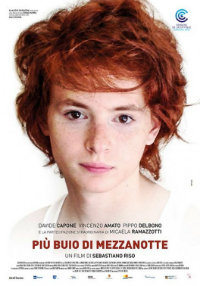Midnight Toil: Riso’s Debut Ambient Yet Ultimately Remote Tale of Teenage Woe
 You might forget the ‘based on a true story’ warning during the opening credits of Darker Than Midnight (Piu buio di mezzanote) by the time we get to the final frames, as a desolate shriek pierces your memory as you retreat to the theater exit. But, in fact, Sebastian Riso’s technically assured directorial debut is the tale of Davide Cordova’s adolescent woe, otherwise known as the famed drag queen Fuxia of Rome’s historic gay bar, Muccassassina. Set in 1980s Catania, it charts the familial discord and abuse that resulted in his taking to the streets at the onset of his sexual awakening. Certainly providing an aura of threat and menace, Riso’s rendering plays like the set-up to an effective genre entry, but the film eventually plateau’s into a tailspin of instances that create a notable emotional distance from the plight of Davide and the street prostitutes he befriends.
You might forget the ‘based on a true story’ warning during the opening credits of Darker Than Midnight (Piu buio di mezzanote) by the time we get to the final frames, as a desolate shriek pierces your memory as you retreat to the theater exit. But, in fact, Sebastian Riso’s technically assured directorial debut is the tale of Davide Cordova’s adolescent woe, otherwise known as the famed drag queen Fuxia of Rome’s historic gay bar, Muccassassina. Set in 1980s Catania, it charts the familial discord and abuse that resulted in his taking to the streets at the onset of his sexual awakening. Certainly providing an aura of threat and menace, Riso’s rendering plays like the set-up to an effective genre entry, but the film eventually plateau’s into a tailspin of instances that create a notable emotional distance from the plight of Davide and the street prostitutes he befriends.
After fleeing a hostile home environment, where increasing tensions have led to mounting abuse at the hands of his father (Vincenzo Amato), fourteen year old Davide (Davide Capone) runs away to live on the streets of Catania. After following some young guys into a porno theater, he ends up meeting a new friend, Rettore (Giovanni Gulizia), who shows him the ropes and introduces him to a small community of misfits that make ends meet by working the streets. A virgin, he slowly acclimates to this new way of life, observing those around him. Painful memories haunt him, and we get hints of emotional abuse and even incest from his recent past. Spying a handsome young hustler, Davide becomes enamored and experiences his first taste of love. But when something tragic happens to Rettore and it becomes more difficult to support himself, Davide considers the offer of his lover’s pimp (Pippo Delbono), who offers him protection.
A final reckoning results in a provocative moment of shocking violence that would have been all the more powerful had a better sense of the fractured relationship between Davide and his father been more fruitfully explored. We meet Davide already committed to getting by on the streets, snippets of a home life that led to such a decision relayed in flashback, where a loving but ultimately weak-willed mother takes a backseat to abusive patriarchy. In scenes where Davide is straightjacketed into heteronormative realities, an encroaching buzz intensifies on the soundtrack, a hum that causes a profound tension, as if threatening to swallow us up in foreboding. Likewise, Piero Basso’s cinematography captures a crumbling fantasy of a time and place where street life promises infinite freedom in comparison. Several supporting characters, such as the Marilyn Monroe transsexual prostitute, may uneasily coast on stereotype for some tastes.
As Davide, newcomer Davide Capone is an arresting presence, his mop of red hair and androgynous persona providing Darker Than Midnight with a captivating performance. Yet, it’s a rendering that tends to rely on style over substance, and though based on the life of Cordova, one would hardly assume so by the end credits. A brief glimpse at a drag queen performer named Louvre hints at the notable personality he would eventually become, yet we leave him here in a moment more befitting an ambiguous horror film. It’s a curious moment to end on, and would have been made all the more powerful if the remainder of the film had managed to be as unique. As it stands, it would’ve helped considerably had we developed a keener sense of the relationship with and between his parents, while his newly made mates are drawn a bit too thin to really register as anything more than familiar types.
Reviewed on May 20 at the 2014 Cannes Film Festival – Critics Week – 98 Minutes
★★½/☆☆☆☆☆


